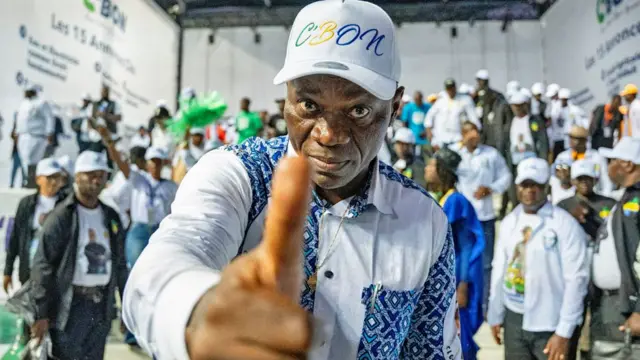
A Gabon coup leader hopes to win a seven-year term in the presidential election
Brice Oligui Nguema, the leader of the coup in Gabon, is trying to solidify his hold on power ahead of Saturday’s presidential election, which observers predict will be a lopsided contest in the oil-producing Central African country.
The 50-year-old Nguema has positioned himself as a change agent, taking aim at the corrupt old guard, 19 months after toppling President Ali Bongo, whose family dominated Gabon for nearly 50 years.
Throughout the campaign, Nguema, who has been acting as temporary leader since spearheading the coup as an army officer, has crisscrossed Gabon while sporting a baseball cap bearing the motto “We Build Together.”
In an economy where a third of the population lives in poverty, he has pledged to diversify the nation’s oil-dependent economy and support industry, tourism, and agriculture.
He declared, “We have liberated the country to give its people hope,” at his farewell rally in Owendo, a port city, on Thursday.
Voting will take place on Sunday, with polling places opening at 7 a.m. (0600 GMT) and closing at 6 p.m. (1700 GMT). The winner’s tenure will be seven years, with a one-time renewal.
The prime minister under Bongo before to the August 2023 coup, the seventh in West and Central Africa since 2020, is Alain Claude Bilie By Nze, his principal opponent.
Nze, 57, has told Reuters this week that military troops should “go back to their barracks” in an attempt to disassociate himself from the Bongo family and to cast doubt on Nguema’s running prowess.
The election of Nguema was made possible by a new constitution that was ratified in November.
His position as the front-runner, according to analysts, stems from the general satisfaction with the coup and his prominence as the best-known contender throughout the campaign.
Nze’s warning that Nguema posed a threat to Gabonese democracy is further undermined by his tight ties to the previous regime, which was accused of vote-rigging by critics but denied it, according to Florence Bernault, a Central African historian at Sciences Po.
According to Bernault, “He doesn’t seem to be very well placed to criticize.”
Power CUts
With a population of about 2.5 million and a thickly forested land, about 900,000 citizens are enrolled to vote at polling places nationwide. Another 28,000 people are registered to vote overseas.
Infrastructure investments and increasing production of commodities including oil, manganese, and lumber helped Gabon’s economy grow by 2.9% in 2024, up from 2.4% in 2023, according to the World Bank.
Many voters, however, told Reuters that they were mostly worried about basic services because the capital frequently experiences power outages.
It’s something we discuss daily. “There is a major urgency because we don’t want to continue having these daily power outages,” stated Herve Regis Ossouami, a 40-year-old electrician.
“I don’t know a Gabonese person who would say they don’t want water and electricity.”
All Categories
Recent Posts
Tags
+13162306000
zoneyetu@yahoo.com



